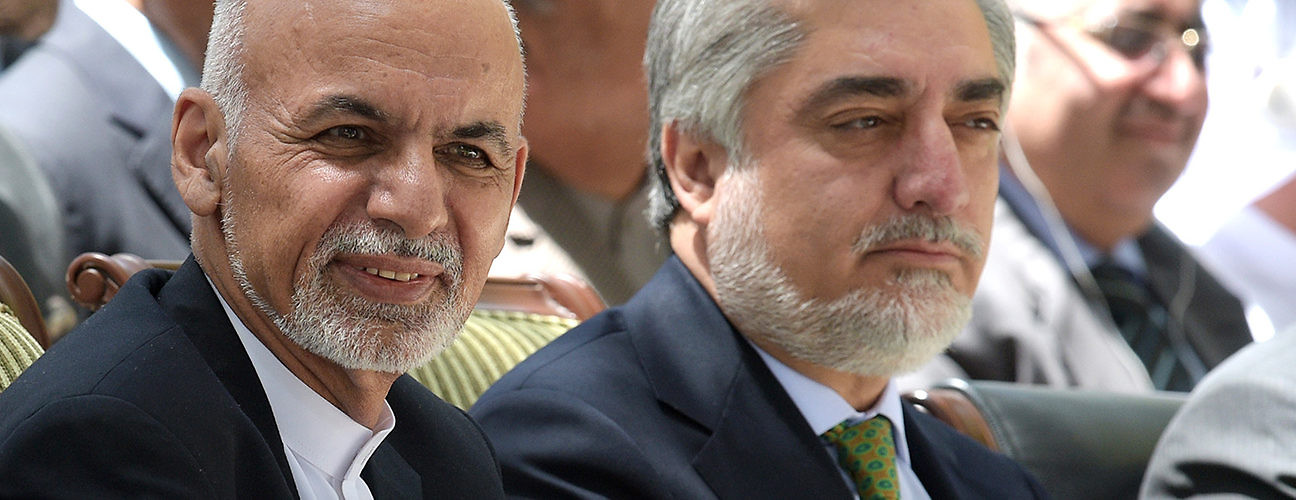Afghan President Ashraf Ghani (left) and Chief Executive Abdullah Adbullah attend a meeting with Germany's foreign minister. Kabul, Afghanistan, August 30, 2015. (Rainer Jensen/DPA/Associated Press)
An attack on Kabul’s American University yesterday that killed 13 and injured many more is a stark reminder of Afghanistan’s failing security. It also highlights that the country cannot afford to lose its National Unity Government to political instability and bickering between its two leaders, President Ashraf Ghani and Chief Executive Abdullah Abdullah.
Without electoral reforms to allow for the conduct of parliamentary elections, convening of a constitutional loya jirga, or grand assembly, seems highly unlikely by the end of September, as required by a power-sharing agreement between Abdullah and Ghani struck in 2014. Delays in this process were largely behind Abdullah’s public denouncement earlier this month of Ghani’s fitness to govern.
The unity government, put in place through a United States-brokered agreement following disputed elections, was designed to allow the two rivals to jointly govern and make strides toward genuine democracy. Its continuing struggles mean the US and wider international community must reassess their long-term strategy in Afghanistan.
Under the 2014 deal, Ghani was tasked with convening the loya jirga with the intention of reforming Afghanistan’s 2004 constitution and reexamining the form and structure of its government. This was expected to support creation of an “executive prime minister” position within the existing presidential system, allowing Abdullah to hold a constitutionally mandated role with more extensive powers.
There has also been a deadlock over the means of allocating parliamentary seats when the election is eventually held, with Afghanistan’s Special Electoral Reforms Commissions advocating a system that would allot 30% by proportional representation, and the Pashtun ethnic majority calling for single-member districts and a first-past-the-post system. Without this impasse being broken, any poll results would be heavily contested among the country’s ethnic-based powerbrokers.
Additionally, with growing insecurity across various provinces—the total area under government control or influence decreased from 70% to 65% between January and May 2016—and a failing economy heavily dependent on international donor support, conducting nationwide elections is currently a huge logistical challenge. The recent spate of militant attacks in Kabul, including incidents targeting foreign guesthouses and peace rallies, represents a grave deterioration of security, with even the capital’s so-called “ring of steel” no longer considered safe.
Former Afghanistan President Hamid Karzai has also been a prominent critic of Ghani and the unity government. He has constantly questioned the political agreement and supported the loya jirga being held immediately as a means of testing the legitimacy of the politically brokered government. Karzai has unequivocally opposed US Secretary of State John Kerry’s endorsement of the government’s tenure extending to a full five-year term without this process occurring.
The former leader has long been suspected of supporting the assembly as a means of exposing the incompetence of the government and enhancing his own bid for a return to power. Karzai has recognized support among tribal leaders and other powerbrokers, which Ghani lacks, and is critical of the president’s technocratic style of running the government. These drawbacks have no doubt contributed to Ghani’s inability to control the fallout with Abdullah.
A recent report from the Center on International Cooperation suggests that the lack of reforms and general insecurity in Afghanistan make a loya jirga unfeasible in the near term. The report’s authors also identify further technical impediments to holding elections, including delays both in distributing voter identification and preparation of electronic electoral rolls, and point to the lengthy preparation and inevitable debate over jurisprudence that must precede creation of an executive prime minister role.
Given all these factors, the most practical approach does seem for the international community to support the unity government in completing its current five-year term. The Warsaw Summit Declaration of July 2016, which extends NATO’s mandate in Afghanistan to further strengthen, assist, and support the national defense forces has been a welcome relief in this respect; as has US President Barrack Obama’s decision to maintain a higher number of troops in the country. The upcoming Brussels Conference on Afghanistan, in October this year, will be crucial in further restoring international political and economic support, following the recent diversion of funds to other conflicts such as Syria.
Failure of the unity government to complete its tenure would likely further destabilize Afghanistan and threaten gains made in the past 15 years. While the need to publicly legitimize power sharing and the structure of the unity government is built into the agreement itself, Ghani and Abdullah could find other ways to negotiate outcomes that will be acceptable to both their power bases. Reevaluating the failed terms of their agreement could be coupled with detailed plans for addressing pressing concerns such as ensuring security, sparking economic development and employment, fighting corruption, and, most importantly, effectively engaging the Taliban in the ongoing peace process.
Any rigid demands for a constitutional amendment to create two equal heads of state could lead to another political crisis in the long run, with the very real potential of ushering in perpetual ethnic-based political strife. Effective engagement with all political factions remains the priority for the international community. While Obama’s foreign policy favors supporting the country’s post-conflict transformation without getting too involved in nation building, this may prove challenging for his successors. Ghani and Abdullah need support in creating a culture of mutual accountability, including to their fellow Afghans.
Suparva Narasimhaiah is a Researcher at the Afghanistan Research and Evaluation Unit in Kabul.





